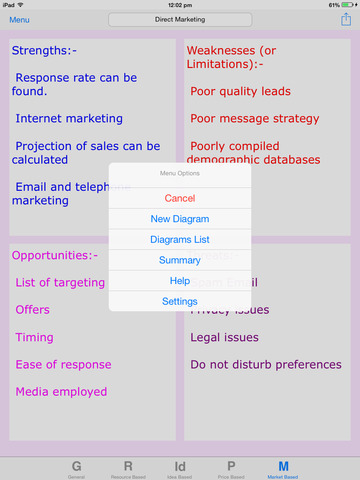
SWOT Chart
SWOT analysis (alternately SLOT analysis) is a strategic planning method used to evaluate the Strengths, Weaknesses/Limitations, Opportunities, and Threats involved in a project or in a business venture. It involves specifying the objective of the business venture or project and identifying the internal and external factors that are favorable and unfavorable to achieve that objective. The technique is credited to Albert Humphrey, who presided a convention at Stanford University in the 1960s and 1970s using data from Fortune 500 companies.
Setting the objective should be done after the SWOT analysis has been performed. This would allow achievable goals or objectives to be set for the organization.
▪Strengths: characteristics of the business, or project team that give it an advantage over others
▪Weaknesses (or Limitations): are characteristics that place the team at a disadvantage relative to others
▪Opportunities: external chances to improve performance (e.g. make greater profits) in the environment
▪Threats: external elements in the environment that could cause trouble for the business or project
Identification of SWOTs is essential because subsequent steps in the process of planning for achievement of the selected objective may be derived from the SWOTs.
First, the decision makers have to determine whether the objective is attainable, given the SWOTs. If the objective is NOT attainable a different objective must be selected and the process repeated.
Users of SWOT analysis need to ask and answer questions that generate meaningful information for each category (strengths, opportunities, weaknesses, and threats) in order to maximize the benefits of this evaluation and find their competitive advantage.
Matching and converting
One way of utilizing SWOT is matching and converting. Matching is used to find competitive advantages by matching the strengths to opportunities. Converting is to apply conversion strategies to convert weaknesses or threats into strengths or opportunities. An example of conversion strategy is to find new markets. If the threats or weaknesses cannot be converted a company should try to minimize or avoid them.
Use of SWOT analysis
The usefulness of SWOT analysis is not limited to profit-seeking organizations. SWOT analysis may be used in any decision-making situation when a desired end-state (objective) has been defined. Examples include: non-profit organizations, governmental units, and individuals. SWOT analysis may also be used in pre-crisis planning and preventive crisis management. SWOT analysis may also be used in creating a recommendation during a viability study/survey.
There are four text boxes named Strength,Weaknesses,Opportunities & Threats.Hit each text box and enter details.Hit New Swot Chart text box(top),give a name to the Swot Chart and hit menu >save.HitNew Swot Chart text box(top) drop down button and select a saved Swot Chart to view and edit the details.Hit menu > New Swot Chart to prepare a new Swot Chart.Hit menu > Summary to view the summary of active Swot Chart.
The SWOT chart can be moved(panned) up/down.



